
Yasujiro Ozu's motion picture career spanned half a century. In that time, the Japanese master established a signature style, creating mildly paced stories about regular families that quietly explained how the bonds of blood and commonality of our day-to-day struggles were stronger than the divisions between generations and anything modern life could throw our way. Ozu had a strong sense of tradition, but after World War II, he also gradually accepted that Japan was evolving. In his later work, he looked for a balance between the past and the future, and in his final film, the fitting good-bye An Autumn Afternoon, Ozu found it.
Released in 1962, An Autumn Afternoon (Japanese title: Sanma No Aji) is primarily about the Hirayama family, but Ozu also takes the time to look at some of the lives in their extended circle. The head of the family, Shuhei Hirayama (Chishu Ryu), is a widower living with his only daughter, Michiko (Shima Iwashita), and his youngest son, Kazuo (Shinichiro Mikami). His eldest boy, Koichi (Keiji Sada), is married and living in his own apartment with his wife, Akiko (Mariko Okada). Hirayama is a war veteran, having captained a battleship, but he now works in a quiet office. When one of the ladies in his office announces that she is leaving to get married, it starts Hirayama thinking about his own daughter, who is in her early twenties, and if maybe she should get married, too. Coincidentally, his best friend Kawai (Nobuo Nakamura) has been thinking the same thing, and he has found a match he thinks would be perfect for Michiko.
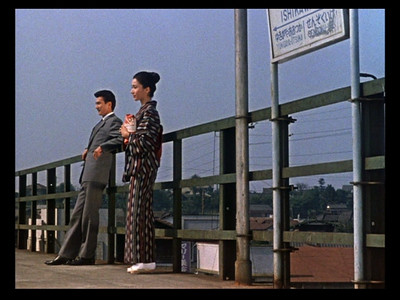
At the same time, Hirayama's regular lunches with his school chums Kawai and Horie (Ryuji Kita) are now spilling over into a forty-year class reunion. It is attended by one of their teachers, an old man they had affectionately nicknamed "the Gourd" when they were children. The Gourd (Eijiro Tono) now runs a noodle shop, where he lives with his daughter. She never married so that she could take care of her father. Michiko has given the same excuse for not moving out on her own, and though Hirayama doesn't want to admit it, he sees a similar fate to the Gourd for them both if he doesn't let go of Michiko and get her to let go in return.
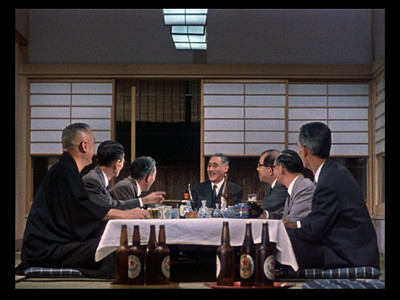
There is an overwhelming sense of nostalgia in An Autumn Afternoon. With Hirayama as the central character, Ozu creates a variety of scenarios that compel the character to look backward and contemplate where he is going. So, too, is the filmmaker looking back, surveying the cultural landscape he has traversed to get to this point. Co-written by Ozu and Kogo Noda, it's hard to think of a more effective summation of a career than this one. Though the subplot between the older students and their teacher will find its place as the main plotline in Akira Kurosawa's farewell, Madadayo
As a counterpoint to the perhaps more traditional situation where Michiko sacrifices her independent happiness to serve her father, the older son Koichi and his wife live a modern existence where they embrace more Western luxuries like golf clubs, vacuums, and refrigerators. They even eat ham and eggs, which isn't quite your average Japanese cuisine. Yet, it's also telling that they are completely dependent on Hirayama, having to borrow money from him in order to have these luxuries. The father doesn't mind, however, he feels that young people should go out and forge their own way, and he's more than happy to help. When Hirayama runs into a sailor who had been under his command in the war, that man (Daisuke Kato) wonders what life would have been like if Japan had won and were now influencing American youth to be more Japanese. Hirayama meekly responds that he thinks he feels it's best that Japan was not the victor. It's at least quieter this way. Change is all right by him.
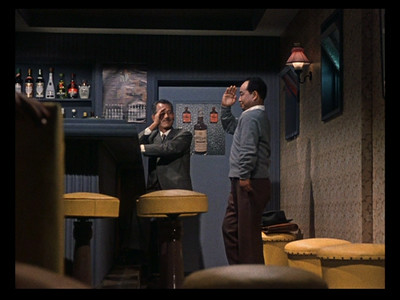
Though, Hirayama is not entirely ready to be a full part of that change. His friend Horie has remarried, taking a much younger woman as his bride. He encourages Hirayama to do the same. (He also encourages him to take some kind of pills for male stamina. An early prototype for Viagra?!) Hirayama even indulges a mild crush on a bar hostess (Kyoko Kishida) that reminds him of his dead wife. He's very sweet when he talks about her, noting that they don't look the same when you look close, but really being far more romantic in that what he is treasuring is the essence of his companion and not just her physical appearance. He never does anything about these unrequited feelings, though perhaps he would have had Koichi been more supportive of them. As the older generation encourages the younger to move forward, it doesn't apparently cut both ways.
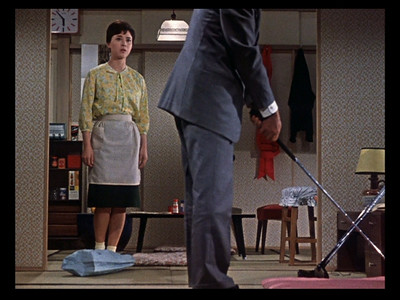
An Autumn Afternoon ends on a bittersweet note. I think a large part of the film's honesty comes from the fact that Ozu doesn't push his character into a complete, unreserved acceptance of how times have changed. I doubt he felt that way himself; instead, the wisdom of age had taught him that his time had passed. The first shots of the movie are of a factory and its smokestacks belching waste into the blue sky, an image of the industrial age. The final shots are of Hirayama sitting alone, a little drunk, on his daughter's wedding night, quietly drifting into sleep. You couldn't get a sharper contrast than those two pictures. It's a gentle reminder from an elder stateseman that even if we accept the new inventions of our modern age, we must never forget the human element.
It's also a farewell from a master filmmaker handing the baton to a new cinema (even if Ozu was preparing a new film when he died). With technology changing and the possibilities for cinema that lay just around the corner, Ozu's message seems prescient. No special effects can ever replicate what he has done as a director. It takes heart and soul to depict a story with heart and soul. An Autumn Afternoon has plenty of both, setting the standard even as its director stepped aside.
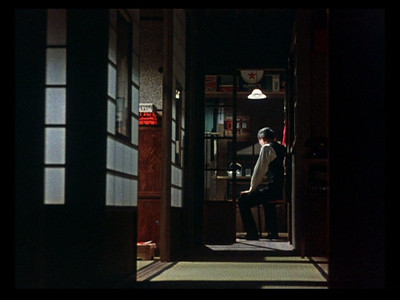
For a full rundown on the special features, read the full article at DVD Talk.

2 comments:
Excellent article. I am a fan of Ozu myself, and find that it is difficult to convey to people how amazing his films are. The fact is, his films are less reliant on literary conventions than many other influential filmmakers. It is for this reason that synopses typically fail to capture his cinematic vision. One simply cannot write about the verbally-unexpressed tones of sadness, pain, and joy that pervade his works, but you have managed to capture what makes these films so wonderful in a manner that is quite eloquent.
Wow, thank you, Nicholas. I'm flattered. Especially because I agree with you. Reviewing Ozu is always a challenge, because it really does feel like that so much of his films are about the unsaid, and one you articulate that, the quality his style inspires dissipates.
Post a Comment